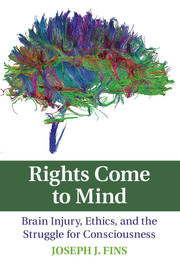Book contents
- Frontmatter
- Dedication
- Epigraph
- Contents
- Miscellaneous Frontmatter
- Acknowledgments
- Introduction
- 1 Decisions
- 2 The Injury
- 3 Coming to Terms with Brain Injury
- 4 The Origins of the Vegetative State
- 5 A Shift since Quinlan
- 6 Maggie's Wishes
- 7 Something Happened in Arkansas
- 8 From PVS to MCS
- 9 Leaving the Hospital
- 10 Heather's Story
- 11 Neuroimaging and Neuroscience in the Public Mind
- 12 Contractures and Contradictions: Medical Necessity and the Injured Brain
- 13 Minds, Monuments, and Moments
- 14 Heads and Hearts, Toil and Tears
- 15 What Do Families Want?
- 16 Deep Brain Stimulation in MCS
- 17 Mending Our Brains, Minding Our Ethics
- 18 It's Still Freedom
- 19 Maggie Is in Town
- 20 When Consciousness Becomes Prosthetic
- 21 The Rights of Mind
- 22 A Call for Advocacy
- Epilogue
- Notes
- In Memoriam
- Index
12 - Contractures and Contradictions: Medical Necessity and the Injured Brain
Published online by Cambridge University Press: 05 September 2015
- Frontmatter
- Dedication
- Epigraph
- Contents
- Miscellaneous Frontmatter
- Acknowledgments
- Introduction
- 1 Decisions
- 2 The Injury
- 3 Coming to Terms with Brain Injury
- 4 The Origins of the Vegetative State
- 5 A Shift since Quinlan
- 6 Maggie's Wishes
- 7 Something Happened in Arkansas
- 8 From PVS to MCS
- 9 Leaving the Hospital
- 10 Heather's Story
- 11 Neuroimaging and Neuroscience in the Public Mind
- 12 Contractures and Contradictions: Medical Necessity and the Injured Brain
- 13 Minds, Monuments, and Moments
- 14 Heads and Hearts, Toil and Tears
- 15 What Do Families Want?
- 16 Deep Brain Stimulation in MCS
- 17 Mending Our Brains, Minding Our Ethics
- 18 It's Still Freedom
- 19 Maggie Is in Town
- 20 When Consciousness Becomes Prosthetic
- 21 The Rights of Mind
- 22 A Call for Advocacy
- Epilogue
- Notes
- In Memoriam
- Index
Summary
Tribal Counsels
Maggie left Worcester Hospital for Spaulding, a leading rehabilitation center in Boston, on May 17, 2006. The good news was that Spaulding offered her three hours of therapy each day, five days a week. Even better, it was paid for. But it did not start off that way.
Maggie was covered by her father's health insurance plan, which he had through his work for a tribal casino in Connecticut. The problem with the move to Boston was that Spaulding was out of state and out of Paul's insurance network. This is not an uncommon problem for people seeking rehabilitation for brain injury, whose options are often limited by geography, either because of limits within private networks or by state-based Medicare plans.
Maggie's challenge was that the care that her family wanted her to receive was from an out-of-network provider. But unlike most cases in which an appeal would be presented to an insurance company, Paul took her case to the tribal counsel and they made an individual decision in favor of providing for her initial rehabilitation at Spaulding. Nancy was not sure why the tribe decided this way but speculated that it may have been “… because Paul had friends in the Indian community, or maybe they decided because it was a disability and they were compassionate.”
Either way, I found their deliberations interesting. Maggie was not an abstract case from an unknown family, but the daughter of a friend and a colleague who needed help, who needed a hand. It was a communitarian response of mutual support in which each member of that counsel could personally imagine the ordeal that this one family was facing and how they collectively might temper that burden. The counsel's proximity to the people involved in the case, who would be affected by their decision, brought both integrity and compassion to the deliberations.
- Type
- Chapter
- Information
- Rights Come to MindBrain Injury, Ethics, and the Struggle for Consciousness, pp. 134 - 164Publisher: Cambridge University PressPrint publication year: 2015



